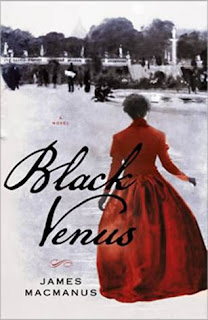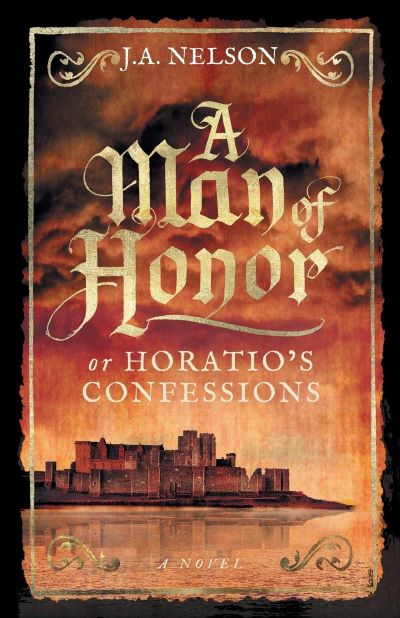Black Venus by James MacManus
Review copy provided Thomas Dunne Books via Meryl L. Moss
Media Relations, Inc. in exchange for a fair and honest review
Baudelaire’s fortunes rose and fell under the influence of
his Venus Noir
Addictive as opium the voluptuous Haitian cabaret singer
Jeanne Duval tortured and inspired Charles Baudelaire to create poetry that
would forever change the world of literature. Their love played out against the
backdrop of 19th-century Paris in the Left Bank cafes and taverns frequented by
such giants as Édouard Manet, Honoré de Balzac and Alexandre Dumas. Reviled by Baudelaire’s family, friends and
publisher, Duval was Baudelaire’s muse, leading him to create the poetry whose
dark and passionate imagery forever changed and influenced modern literature.
Baudelaire was squandering his small fortune on alcohol and
women when he met Duval, who he called Black Venus and claimed as his mistress.
Their fiery relationship became the catalyst for his work—without her he
couldn’t write a word. Ironically, Duval scorned Les Fleurs de Mal—The Flowers
of Evil—the slim volume of poems she inspired that outraged French morals
causing Baudelaire and his publisher to be forced into a scandalous public
trial for obscenity. What hold did she
have on him that he allowed her to betray him in every possible way, driving
him into debt and opium addiction even as she openly slept with his friends?
Author James MacManus brings the world of the Left Bank
vividly to life in his novel BLACK VENUS (Thomas Dunne Books; May 7, 2013)
based on the historic facts surrounding their torrid love affair even as the
arts flourished in Paris’s most decadent and prolific period.
My Take:
I jumped at the chance to read and review Black Venus for a
couple of reasons. First, Baudelaire has always been an enigma to me; second, I
love reading about the city of Paris during this time period.
Baudelaire has always been a poet that I just had to
appreciate the poetry without really understanding or pretending to understand
the poet himself. He is such an important poet that I always hated that aspect
of reading his poems -- even though we know Les Fleurs de Mal is all about
Jeanne Duval -- who is looked down on by most everyone I have ever encountered.
Black Venus by James MacManus is an historical fiction novel that tries to
explore their relationship and at least try to explain how the dynamic between
them might have worked. The way their relationship
worked, as explained in the book, is really quite fascinating and as described,
makes quite a bit of sense. Unfortunately, their relationship, while quite
passionate, pretty much destroyed them. As a couple, they seemed to bring out
the worst in each other, and yet Duval was the inspiration for some of the most important poems to come out of
France.
Besides the interesting dynamic of the relationship between
Baudelaire and Duval, the novel also gives a wonderful glimpse of Paris and its
beauty and seediness and the fascinating contrast between the rich and the
masses of poor living within the city. It brings to life this contrast as well
as the lives of the artists and writers and the politics of the period.
I found Black Venus to be very readable and quite
fascinating. While I enjoyed reading the book, I found both Baudelaire and
Duval to be very complex people and both were somewhat hard to like. They were
that couple that stays together even
when everyone around them knows they should break up - for their own
well-being. So frustrating and fascinating.
I would recommend Black Venus to anyone interested in
historical fiction, Baudelaire, poetry,
Paris, the artists of the period, and the society and lifestyles of the various
groups within Parisian society.
You can check out the rest of the tour here.
About the author:
 James MacManus, who was born in London, began his career
with The Guardian first as a reporter in the London office and then as a
foreign correspondent in France, Africa and the Middle East. Following a
position on the diplomatic staff of the Daily Telegraph in London, he joined
The Times, eventually rising to Managing Editor then Managing Director of The
Times Literary Supplement. In 2006 his first screenplay became the major motion
picture, The Children of Huang Shi, and in 2010 his critically acclaimed first
novel, Language of the Sea, made its debut.
James MacManus, who was born in London, began his career
with The Guardian first as a reporter in the London office and then as a
foreign correspondent in France, Africa and the Middle East. Following a
position on the diplomatic staff of the Daily Telegraph in London, he joined
The Times, eventually rising to Managing Editor then Managing Director of The
Times Literary Supplement. In 2006 his first screenplay became the major motion
picture, The Children of Huang Shi, and in 2010 his critically acclaimed first
novel, Language of the Sea, made its debut.














